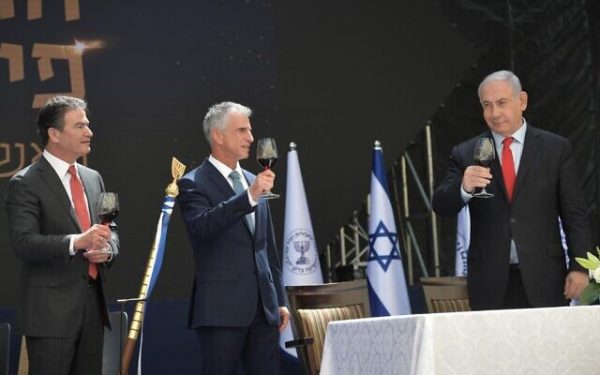 New Mossad chief David Barnea warned on Tuesday that Iran was working to fulfill its “dream” of acquiring an atomic bomb, even as it holds talks with world powers on restoring the 2015 deal limiting its nuclear program.
New Mossad chief David Barnea warned on Tuesday that Iran was working to fulfill its “dream” of acquiring an atomic bomb, even as it holds talks with world powers on restoring the 2015 deal limiting its nuclear program.
“Our security challenges are very big and at the top of the list is Iran,” Barnea said at a ceremony marking his entry into office as head of the spy agency, succeeding outgoing spymaster Yossi Cohen. “This needs to be said loudly and clearly: Iran is working, even at this very moment, to fulfill its nuclear dream under an international guise of protection.”
He said that “under the protection of the agreement and without it, with lies and concealments, Iran is making constant progress toward a weapons of mass destruction program.”
Barnea, who is also known by his nickname Dedi, replaces outgoing director Cohen. He served as a combat soldier in the elite Sayeret Matkal commando unit and has been in the Mossad for the past 25 years, including in prominent operational roles that saw him rise to lead the branch that handles the organization’s agents worldwide.
Announcing Barnea’s appointment last week, Prime Minister Benjamin Netanyahu said his top task was “to prevent Iran from acquiring nuclear weapons.”
Speaking at the ceremony on Tuesday, Netanyahu said that if pushed to choose between a lack of friction with the US or defending the country against the nuclear threat from Iran, Israel will choose to confront the Islamic republic.
Netanyahu said Israel must “do everything, but everything, in order to ensure that under no circumstance Iran arms itself with nuclear weapons.

“The greatest threat against us is the existential threat which is presented by Iran’s attempt to arm itself with nuclear weapons,” Netanyahu said.
Faced with a choice between relations with the US or neutralizing Iran, “the elimination of the existential threat prevails,” he said.
The prime minister noted that in his recent conversations with US President Joe Biden he had stressed that whether or not world powers manage to revive the 2015 deal that aimed to prevent Iran from obtaining nuclear weapons, “we will continue to do everything we have at our disposal to thwart Iran’s armament with nuclear weapons.” In 2015, the US negotiation of the accord resulted in tensions between Netanyahu and then-president Barack Obama.
Netanyahu’s remarks came the day after the UN nuclear watchdog voiced concern that Iran had not clarified queries over possible undeclared nuclear activity, adding that its enriched uranium stockpile was 16 times the limit set out in the 2015 accord.
The two reports issued by the International Atomic Energy Agency (IAEA) on Monday are the first substantive reports since Iran suspended some inspections in February.
One of the reports said IAEA director general Rafael Grossi was “concerned that the technical discussions between the agency and Iran have not yielded the expected results,” referring to exchanges on the sites where undeclared nuclear activity may have occurred.

Iran and world powers are engaged in talks in Vienna to rescue the 2015 nuclear deal after former US president Donald Trump walked away from it in 2018 and reimposed crippling sanctions on Tehran.
Trump’s successor Biden has signaled his willingness to revive the agreement.
For this to happen, the US would need to return to the accord and lift the sanctions reinstated by Trump while Tehran would have to re-commit to full compliance with nuclear obligations it progressively withdrew from since 2019. Under the 2015 deal, the enrichment level was meant to be capped at 3.67%, well below the 90% purity needed for a nuclear weapon.
Talks to restore the 2015 deal are taking place in Vienna as Iran prepares for presidential elections on June 18.
Israel, which is coordinating with the US, has expressed its opposition to returning to the deal as is, saying it requires further tightening to rein in Iran’s ballistic missile program and support for terror groups.